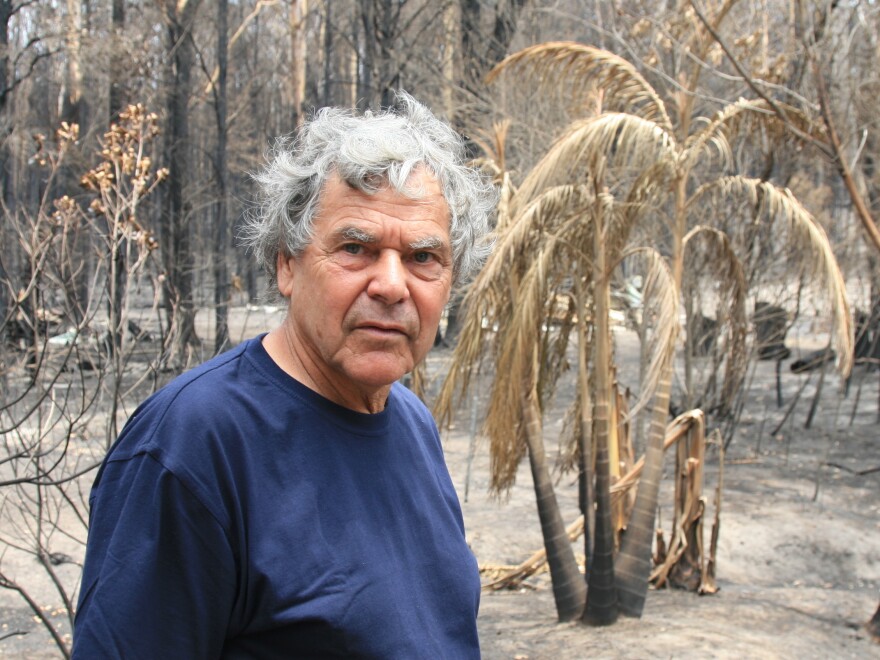Before Britain started sending convicts to the continent in the 1700s, aboriginal Australians used fire to manage brushlands and forests across the continent.
Noel Butler — who's known even to the fire crews at the end of his road as "Uncle Noel" — and his wife, Trish, used to run the Nuragunya Aboriginal culture and education camp deep in a forest in the state of New South Wales.
But last week, an inferno swept through their canyon.
"That's what's left of our house," Butler says, pointing at a pile of charred timbers, ash and twisted sheet metal. "That was a two story A-frame house which I built."
The inferno torched his house, the camp, his workshop and the surrounding woods for miles. The ground is covered in powdery ash. Every tree trunk is charred black. Some of them still smolder.
"Not a single thing is left. It's all absolutely, completely destroyed."

Butler has been burying kangaroos and wallabies that were killed in the blaze. But he has seen one large grey kangaroo still alive and the tracks of some wallabies. A few birds have returned. But there's no food for them, so Butler is putting out hay for the kangaroos and chicken feed for the wallabies.
"Wallabies are like long-legged goats. They'll eat anything."
Butler and his wife once used this place to hold camps and workshops on aboriginal culture. They had a program for troubled indigenous youth. School groups would come to learn about native art, history and food. Fire was a key issue they would teach about.
"Fire in this place is our friend," he says. "Fire has been used to maintain, to look after this whole continent forever."
Native peoples called them "cool burns," low-intensity fires intended to balance the various plants and trees growing in an area.
"How we maintain that balance is through fire, by not letting any one thing dominate something else," says Butler.
The eucalyptus shouldn't be allowed to overrun all the other trees, he explains. If one shrub starts to take over a grassland, it should get burned back.
Aboriginal people have generations of knowledge about managing the landscape on this continent, but Butler says they're ignored by public officials who rely on the massive controlled burns, known as back-burns. Butler says cool burns target specific areas and even specific plants, while the current methods destroy everything in their paths.
There has been a torrent of criticism over the blazes. This week, the New South Wales Rural Fire Service commissioner, Shane Fitzsimmons, defended the tactic. The clearly frustrated commissioner declared, "We are not environmental bastards," saying that the burns are necessary to try to cutback the amount fuel available for the next blaze.
But Butler believes the current methods aren't working. Fires have been burning across Australia for months, destroying more than 17 million acres of land. At least 26 people have died in the fires, which have also killed more than a billion animals and damaged or destroyed nearly 3,000 homes. Officials say they could continue to burn for months.
"The place is heading for destruction. Nobody can deny it," Butler says. "No one can say this is just normal. It isn't."
Australia had its hottest and driest year on record in 2019. Butler puts the blame squarely on humans, who he says have not respected the Earth, mismanaging the land and continuing to burn fossil fuels.
"I think this is a wake-up call not only for Australia but for the rest of the world. You cannot just destroy the land. You cannot destroy what keeps you alive."
Butler's father told him a long time ago, he says, that the white man may have to destroy himself in order to save himself. Butler is worried that may be coming true.
Despite losing everything on his property, Butler and his wife plan to rebuild their aboriginal culture center. He says the training they do on traditional practices are more important now than ever.
Copyright 2021 NPR. To see more, visit https://www.npr.org. 9(MDAxNzg0MDExMDEyMTYyMjc1MDE3NGVmMw004))








